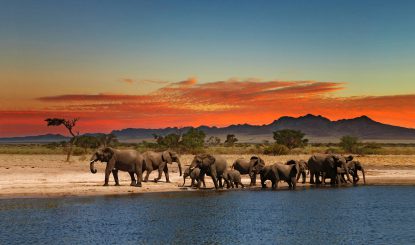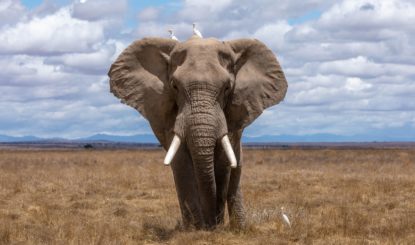Research shows rampant poaching of African elephants is NOT declining
Elephant poaching throughout Africa is not declining. This is according to the latest scientific analysis by Elephants Without Borders (EWB) in collaboration with researchers at the University of Washington and the Amboseli Trust for Elephants.
Beginning around 2007, a wave of poaching for ivory affected populations of savannah elephants and forest elephants across Africa. The total population of savannah elephants decreased by 30% between 2007 and 2015, and an estimated 100,000 elephants of both species were poached between 2010 and 2012. In some countries, elephant populations declined by over 50% in under 10 years. With elephant populations and ranges already greatly reduced from pre-colonial levels, such losses put many populations at risk of extirpation.
However, some recent studies suggested that poaching peaked in 2011 and has been declining since then. Yet, lead author of the study Dr Scott Schlossberg, an analyst with EWB, says, “reports of falling poaching rates in Africa are something of an illusion. Regionally, elephant poaching is decreasing only in Eastern Africa. For the rest of the continent, poaching rates are still near their peak and have changed little since 2011.”
Ongoing poaching in Central and Western Africa is of special concern. In Western Africa, remaining elephants are mostly in small, scattered populations that may be too small to withstand much poaching. Central Africa is the home of the African forest elephant, a distinct species that has experienced severe losses due to poaching and habitat loss in recent years.
Benoit Doamba of Burkina Faso’s Ministry of Environment supports the findings. He states that from his country’s perspective, “poaching has not decreased” and “criminal networks have multiplied”. Doamba also points out that, given the current pandemic and resultant absence of rangers, these networks have been “left free to operate.”
Southern Africa: the new poaching hotspot
Even southern Africa, where the largest remaining population of African elephants resides, there has been a dramatic increase in poaching. Analyses of recent large ivory seizuresconducted by Sam Wasser and Kathleen Gobush (also co-authors of the latest research) show that the continent’s largest poaching hotspot may be in northern Botswana and neighbouring countries. At a single site in Botswana, the proportion of illegally killed elephants increased by approximately 60% in 2018.
In Zimbabwe, cyanide poisoning of elephants has steadily been on the rise in recent years with hundreds of elephants dying from this method, while Namibia and South Africa have also registered a year-on-year increase of elephant poaching.
The 2019 Wasser and Gobush study indicated that elephant poaching remains “dominated by large transnational criminal organisations with the potential to wipe out populations in record time” even in strongholds like Botswana.
Legal ivory markets persist
While countries like China, United Kingdom and the United States of America have banned the legal sales of ivory within their borders, most countries still permit legal sales. Co-author Dr Keith Lindsay of Amboseli Trust for Elephants in Kenya and Fondation Franz Weber, says “one could possibly point to the reluctance of two major ivory destinations, the European Union and Japan, to ban their domestic markets.”
Currently, there is little if any political will for the European Union to close its ivory market, even though there is a vague commitment for “… a further tightening of the rules on EU ivory trade” in the EU’s new Biodiversity Strategy. Member states remain opposed to restricting the EU ivory trade with Belgium, Sweden, Spain, Portugal, Ireland, Austria, among others supporting a continuance.
Ivory in Japan fetches high prices for use in jewellery, name seals and picks for the samisen, a traditional stringed instrument. Even though international trade in ivory is prohibited, it is suspected that large volumes of poached ivory have made its way into Japan to meet consumer demand.
Legal ivory sales have long been attributed to providing a cover for the illicit trafficking of ivory. Lindsay suggests the EU and Japan’s closures could go a long way to slowing down elephant poaching rates.
A plea from Africa
In an open letter to the EU’s Vice-President, Frans Timmermans, the Council of Elders of the African Elephant Coalition (AEC), an alliance of more than 30 African States calling for the closure of global domestic ivory markets, wrote that elephants play a key role in promoting and safeguarding Africa’s biodiversity as well as supporting the more than billion people that rely on biodiversity for their well-being.
“Without elephants, our already threatened natural spaces would be drastically reduced,” the letter went on to state. “Wildlife will be confined to ever reducing ecosystems thus further exacerbating the potential spread of future pandemics. The trade in African elephants not only aggravates crucial biodiversity loss but puts the health of humans at risk.”
Editorial Note: this commentary was first published in the African Elephant Journal


